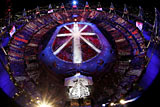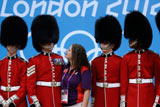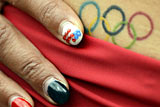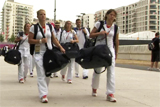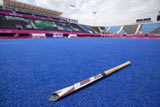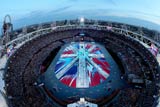
Londoners prepare for transport disruption
Updated: 2012-07-02 17:24:11
(Agencies)
|
|||||||||||
LONDON - When Londoners wake on Monday they will see the latest sign of the Olympics impacting their lives, and probably the most annoying.
As they slept, workmen painted the iconic Olympic rings on some of the capital's roads, marking the 30 miles of tarmac which will be out of bounds to motorists between July 27 and Aug 12.
Although not operational until two days before the Olympics, the Games Lanes are shaping up to be one of the biggest irritants to those living in the capital.
Used to crawling along the city's clogged narrow streets, motorists will now have the added insult of watching 80,000 athletes, officials, sponsors and media moving freely in chauffeur-driven vehicles on the specially designated lanes.
"I think it is unreasonable to expect London to have road closures and places closed off - people still have to get around," said Steve Dixon, 45, a retailer from south London.
"I don't think London is being considered."
The fight for space is likely to be so keen that some taxi drivers are threatening to leave their car keys at home and go away.
"I think it's going to be a nightmare - I won't be able to get around, the roads will be blocked," said taxi driver Scott Rawlings, 45, his black cab idling as he waited to pick up a customer in central London.
"People don't like sitting in the back of a cab when it's not moving."
London's public transport authority Transport for London (TfL), aware of the potential additional gridlock, is keen for motorists to get out of their cars and on to their bikes and into their walking boots.
Walking maps have been distributed at underground rail stations and people will have access to the 8,000 self-service bicycles dotted around the city for hire as part of a drive to get an extra 16 percent walking or cycling.
However, an early report suggested uptake may be only five percent.
River and canal boat journeys are also being promoted but there is limited capacity.
A new cable car, largely privately funded, opened last week which should help ferry passengers across the River Thames near Olympic venues in Greenwich.
Park-and-ride schemes will be put in place.
"Get ahead"
TfL's most high profile campaign during the past 18 months though has been to encourage commuters and sports fans to plan their journeys before boarding buses and underground and overground trains.
Posters have gone up on the underground and a website has been launched to provide up-to-date information and advice on alternative routes.
But catching a bus may not be so easy if bus drivers, who ferry about 6.5 million passengers a day, fail to settle their dispute over Olympic bonuses.
They have already held a 24-hour strike over their demand for an extra 500 pounds for the stress of working during the Games, pointing to other pay deals agreed with London's rail staff.
Another walk-out will take place this week, with a further one scheduled for shortly before the Games.
"It's not the bus drivers who will get stressed - it's the public," said Roz Conway, a 62-year-old artist waiting to hop on one of London's red doubledeckers.
The aging underground rail system is already near capacity and is blighted by overcrowding and unreliability.
Queues are already a common occurrence during rush-hour, compounded by engineering problems such as signal failure.
People have been warned they can expect to queue for more than an hour at certain key intersections, or "hotspots" during the Games.
So TfL is also encouraging commuters to linger over a drink before going home and cajoling office workers to stagger their trips by offering a voucher scheme with cheap theater and cinema tickets.
The message has got through to some, including Marta Blanco, 28, a business development manager who has worked out an alternative route if things get too bad.
TfL is also urging Londoners who do not go away on their summer holidays to work from home or change their working hours.
Combined with a drop in the number of regular tourists, they hope to produce a 30 percent drop in transport use during peak times, leaving room for the anticipated extra three million daily journeys.
Related Stories
London to offer commuters Olympic distractions 2012-03-08
Olympics designated lane 2012-06-18
Photo Gallery
Medal Count |
||||
| 1 | 46 | 29 | 29 | |
| 2 | 38 | 27 | 22 | |
| 3 | 29 | 17 | 19 | |
| 4 | 24 | 25 | 33 | |
| 5 | 13 | 8 | 7 | |
| 6 | 11 | 19 | 14 | |
